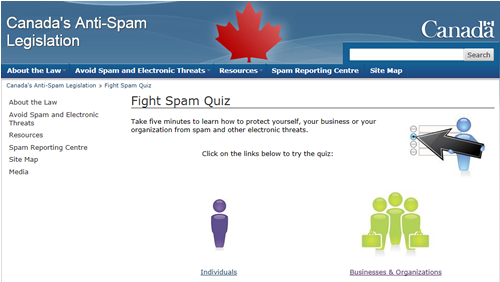Fraud is a big problem for small and big companies. It is estimated that businesses lose up to 5% of revenue because of fraud in the workplace.
Small business must be extra careful because they don't often have anti-fraud controls or policies used in larger organizations. For example, small businesses may not conduct background checks or credit reports on potential hires. All potential hires should have a criminal record check, and in addition a credit report if they are involved in the financial aspect of the business. Small business should also offer consider fraud training and run periodic audits.
Another aspect of fraud is spam and other electronic schemes.
Here is an online quiz which shows individuals and Business how to protect against spam and other electronic threats which lead to fraud. Click on the image to take the quiz.
In Canada, fraud can be reported to the Canadian Anti-Fraud Centre .
"The CAFC is jointly managed by the RCMP, OPP and the Competition Bureau Canada and its mandate has expanded to include many versions of Mass Marketing Fraud (MMF) – these frauds are essentially schemes that target many victims at the same time whether by telephone, facsimile, postal mail or the internet. Often, MMF involves identity crime, which includes identity theft and identity fraud. As a result, the CAFC also accepts these reports. With the Competition Bureau as a partner, the CAFC deals with deceptive marketing practices and with spam issues related to fraud.
The CAFC remains located in North Bay, the city where it was founded. The Call Centre Unit has 11 full-time Call Takers who are able to field more than 300 calls each day from citizens reporting frauds. Of those calls, the Centre logs data from more than 25,000 victims each year. The Call Takers are dedicated, trained anti-fraud specialists who provide advice on the steps that victims should take to recover lost funds and to protect themselves in the future. Each spring, the Call Centre takes on additional personnel to deal with the increased call volumes brought on by publicity for Fraud Awareness Month during the month of March.
The CAFC has established itself as Canada's central fraud data repository. It has become a trusted source for fraud data and for educational and prevention resource materials. The CAFC plays a crucial role in educating the public about specific mass marketing fraud pitches and in collecting and disseminating victim evidence, statistics and documentation, all of which are made available to law enforcement agencies. " source: CAFC
The Renwick Group has the knowledge and experience to help you or your business with fraud investigations. Please call us at 1 (888) 722-9807 to discuss your situation.

No comments:
Post a Comment